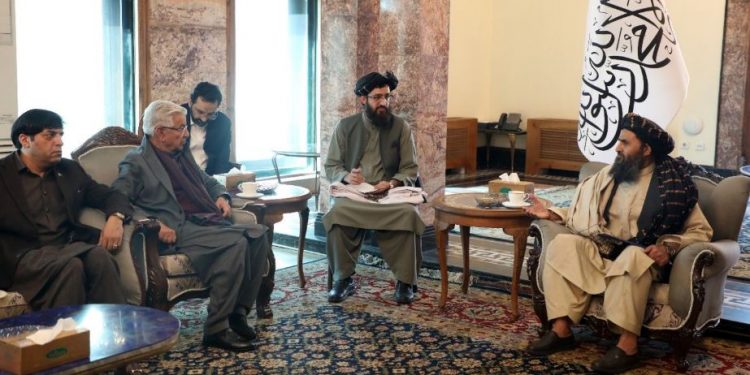Islamabad: A high-level Pakistani delegation led by Defence Minister Khwaja Asif Wednesday met with Afghanistan’s Taliban regime’s acting deputy Prime Minister Mullah Abdul Ghani Baradar and discussed security-related matters including counter-terrorism measures, amidst the worsening of ties between the two neighbours.
Asif is accompanied by Inter-Services Intelligence (ISI) chief Lt Gen Nadeem Anjum, Foreign Secretary Asad Majeed Khan, Charge d’Affaires to Afghanistan Ubaidur Rehman Nizamani and Pakistan’s Special Representative for Afghanistan Mohammad Sadiq.
“A high-ranking delegation led by the Minister for Defence is in Kabul today to meet with officials of the Afghan Interim Government to discuss security-related matters including counter-terrorism measures,” the Foreign Office said in a brief statement.
A statement from the Afghan Council of Ministers (prime minister) said the two sides discussed economic cooperation, regional connectivity, trade, and bilateral relations.
It said that the Afghan deputy prime minister asked the Pakistani delegation to release Taliban prisoners detained in jails across Pakistan. He also asked for more facilities at the two key border crossing points of Torkhan and Chaman.
“Pakistan and Afghanistan are neighbours and should have cordial relations. The Islamic Emirate of Afghanistan wants expansion of commercial and economic relations with Pakistan as such relations are in the interest of both countries,” the statement quoted Baradar as saying.
He noted that political and security issues should not affect trade and economic matters between the two countries and be kept separate from political and security problems.
The Pakistani side assured Afghanistan to resolve the problems, adding that the concerned ministries and committees would be asked to step up efforts for solutions to these problems, according to the statement.
The visit by the delegation comes as the Torkham border trading and crossing point between the two countries remained closed for the third straight day after a deadlock over starting a dialogue prevailed between border officials.
The Afghan side had shut the border crossing, accusing Pakistan of reneging on its commitments, including those related to unhindered movement of people from Afghanistan seeking treatment in Pakistan.
There was mention of the security issues discussed in the Afghan statement but it is believed that Pakistan highlighted the issue of Tehreek-e-Taliban Pakistan (TTP) militants using the Afghan soil for attacks inside Pakistan.
TTP has increased the attacks in recent months and apparently it has become stronger since the takeover of Afghanistan by the Taliban who asked Pakistan to hold talks with the group. But the talks have failed as Islamabad was not ready to accept the demands by the rebels.
In November, the TTP called off an indefinite ceasefire agreed with the government in June and ordered its militants to carry out attacks on the security forces. Since then, Pakistan has seen a rise in terrorist attacks across the country.
The TTP, which has ideological linkages with the Afghan Taliban and also known as the Pakistan Taliban, was set up as an umbrella group of several militant outfits in 2007. Its main aim is to impose its strict brand of Islam across Pakistan.
Pakistan had hoped that the Afghan Taliban after coming to power would stop the use of their soil against Pakistan by expelling the TTP operatives but they have apparently refused to do so at the cost of straining ties with Islamabad.
The TTP, which is believed to be close to al-Qaeda, has been blamed for several deadly attacks across Pakistan, including an attack on army headquarters in 2009, assaults on military bases and the 2008 bombing of the Marriott Hotel in Islamabad.
In 2012, Nobel laureate Malala Yousafzai was attacked by TTP. She suffered bullet injuries and was admitted to the Military Hospital (CMH) Peshawar and then taken to London for further treatment. The TTP claimed responsibility for the attack, saying that Yousafzai was a “Western-minded girl”.
In 2014, the Pakistani Taliban stormed the Army Public School (APS) in the northwestern city of Peshawar, killing at least 150 people, including 131 students. The attack sent shockwaves across the world, and was widely condemned.
PTI






































